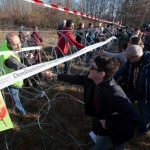The number of migrants is still low, but there are signs that could change.
The refugee crisis in the autumn of last year was one of the most important topics of the 2015 election campaign. The then Prime Minister Zoran Milanović and Interior Minister Ranko Ostojić implemented the transit policy – they let refugees and migrants enter the country and quickly transported them to Hungarian and Slovenian borders. At Croatia’s border with Serbia, there were no ugly scenes which could be seen in Greece, Macedonia, Serbia, Hungary and Slovenia. Croatia acted humanely towards refugees, decisively towards its neighbours and the migrant wave passed through Croatia without any major problems, reports Index.hr on September 2, 2016.
The opposition led by then HDZ president Tomislav Karamarko, and supported by President Kolinda Grabar Kitarović, demanded that Croatia should close its borders, set up a wire fence, and send army to the borders.
In this election campaign, migrants are not an important subject. There is no refugee wave; there are just small groups of migrants crossing the borders which police can easily handle. Turkey is still implementing an agreement reached with the European Union. At the moment, everything seems all right. However, Hungary has deployed army units along the border with Serbia and Croatia, reportedly about 3,000 soldiers. Slovenia says that it will take “extreme measures” if migrants again appear at its borders. The outgoing Prime Minister Tihomir Orešković said recently to German Chancellor Angela Merkel that Croatia did not have the capacity to accommodate a large number of refugees.
However, that does not mean that Croatia is not quietly preparing. The National Protection and Rescue Administration say they are intensively preparing for a new wave of refugees. Their task will be the reception and accommodation of those who manage to enter Croatia. Interior Minister Vlaho Orepić claims there is no reason for concern, but policemen from Slavonia have been returned to their bases from the tourist area where they were sent to help out during the summer months. So far, no one is talking about sending army to control the border, since police can do it more efficiently than the army.
Therefore, Croatia is quietly preparing for a possible mass arrival of migrants. The only question is what it will do. Last year, Zoran Milanović and his transit policy were heavily criticized by Hungarians and Slovenians who have yet to remove fence from their borders with Croatia. Still, he managed to force them to agree to the Croatian way for solving the problem and to allow refugees to pass through their territory. But, he is no longer Prime Minister, and it is not sure who the next Prime Minister will be. Although the outgoing Prime Minister Tihomir Orešković assured Angela Merkel that Croatia will cooperate with its neighbours this time, he will not be Prime Minister for long and he will not be making decisions.








